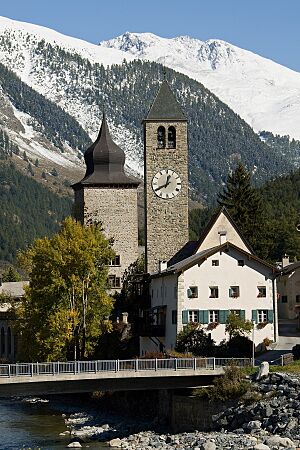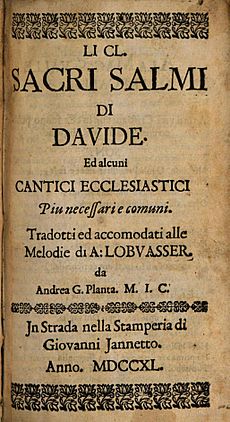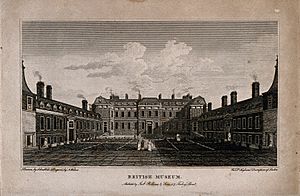Andrew Planta facts for kids
Andrew Joseph Planta, also known as Andreas Joseph von Planta (1717–1773), was a Swiss pastor who moved to England. There, he became a librarian at the famous British Museum. He was born in Susch, a town in Switzerland. He studied to become a pastor in Zürich and then worked in an Italian-speaking church in Castasegna. He even published an Italian book of psalms and prayers in 1740. Later, in 1745, he earned a master's degree from the University of Erlangen.
After working as a teacher for a prince in Germany, he moved to London in 1752. He became the pastor for a German church there. In 1758, he started working as an assistant librarian at the British Museum. In the 1760s, he became a special tutor and reader for Queen Charlotte herself! He was also chosen to be a member of the Royal Society in 1770, which is a very important group for scientists. Many of his daughters later worked as governesses (teachers) for royal or noble families. His son, Joseph Planta, followed in his footsteps at the British Museum and later became its main librarian.
Contents
Early Life and Family
Andrew Planta was born on August 4, 1717, in Susch, Switzerland. His father, Joseph Planta, was an important local leader. His mother was Elisabeth Conrad. The Planta family was one of the most important families in the Engadin area of Switzerland at that time.
While some stories say the family is connected to an ancient Roman family, it's more certain that the Planta family has been well-known since at least the 1100s or 1200s. Andrew had four younger brothers and sisters. His youngest brother, Martin Planta (1727–1772), also became a theologian, teacher, and scientist.
Education and Early Career
In 1734, Andrew Planta began studying theology (the study of religion) at the Schola Tigurina in Zürich. He passed his exams and became a pastor in 1735 in Ilanz, Switzerland. Around 1736 or 1737, he became the pastor of the church in Castasegna. This was one of the few churches where people spoke Italian and were Protestant.
In 1739, he translated a book of psalms (religious songs) by Ambrosius Lobwasser into Italian. This book, called Li CL sacri Salmi di Davide, came out in 1740 along with a book of prayers. He also translated a children's bible by Johann Hübner into Italian. This was published in 1743.
In 1745, Planta went to the University of Erlangen, which was a new university at the time. He earned a master's degree there. From 1745, Planta worked as a teacher for Prince Alexander at the court of Ansbach in Germany. He likely also taught mathematics at a local school.
Life in London
After visiting London, Andrew Planta moved there permanently in 1752. He became the pastor of the German Reformed church at the Savoy Chapel in London, where he served until 1772. His first sermon there was even printed as a book! His family lived in an area called Bloomsbury.
In 1758, he started working as an assistant librarian at the famous British Museum. He helped with the natural history collections from 1758 to 1765, and then with the printed books from 1765 until he died in 1773. After 1761, he became a special reader and taught Italian to Queen Charlotte.
In 1765, when the famous composer Leopold Mozart visited London with his children, including young Wolfgang Amadeus Mozart, Planta welcomed them at the British Museum. He showed them around, probably because Wolfgang had given some of his music to the museum.
Andrew Planta was chosen to be a Fellow of the Royal Society on March 15, 1770. This is a big honor for people who are good at science and learning. The people who suggested him said he was "a Gentleman of good learning, and well versed in natural knowledge." Planta himself later suggested Johann Reinhold Forster to become a Fellow of the Royal Society in 1772.
Andrew Planta passed away on February 25, 1773, and was buried in St George's, Bloomsbury.
Personal Life and Children
Planta married Margarete Scartazzini de Bolgiani in 1738. They had six daughters and one son. Many of their daughters became governesses (private teachers) for important noble families. The family spoke Romansh at home, even when they lived in London.
Their oldest daughter, Anna Planta, was born in Castasegna. She married Christian Minnick in 1762, and they moved to Pennsylvania. Their second child was Elizabeth Planta, born around 1740 or 1741. In 1757, she became a governess.
Their only son, Joseph Planta, was born in 1744. He took over his father's job at the British Museum and later became its main librarian. He lived until 1827.
His younger sister, Frederica Planta, born in 1750, became a governess and English teacher for the daughters of George III and Queen Charlotte. She died in 1778. Her sister, Margaret Planta ("Peggy"), took over her role.
Another sister, Anna Elizabeth (Eliza) Planta, was born in London in 1757. She also became a governess. She later moved to Russia to work for a noble family there. The youngest daughter, Ursula Barbara Planta, passed away in 1834.
Sources
 | Chris Smalls |
 | Fred Hampton |
 | Ralph Abernathy |





